Editor's 'grief' after she leaves industry struck by 'perfect storm'
- Published

"When I left the Impartial it was like grief. I grieved for what had gone. We were like family. It was really hard."
Sarah Saunderson made history as the first female editor of one of Ireland's oldest newspapers in 2014.
Twenty years earlier, she had returned from Scotland to her home town of Enniskillen in County Fermanagh to take a reporter's job with the Impartial Reporter, which is now 194 years old.
Ms Saunderson was excited to follow in the footsteps of her grandparents, who had worked for what is reportedly the longest owned family newspaper in the world.
"It was the mid 1990s, a time of ceasefires and the Good Friday Agreement was en route," she recalled.
"It was all happening and a lot more interesting than the stories I was covering in Scotland. It really worked for me."
She has "amazing" memories of scooping an on-street interview with former US president Bill Clinton and driving healthcare changes.
So why, in her 40s, has she dramatically quit journalism to retrain as a school teacher?
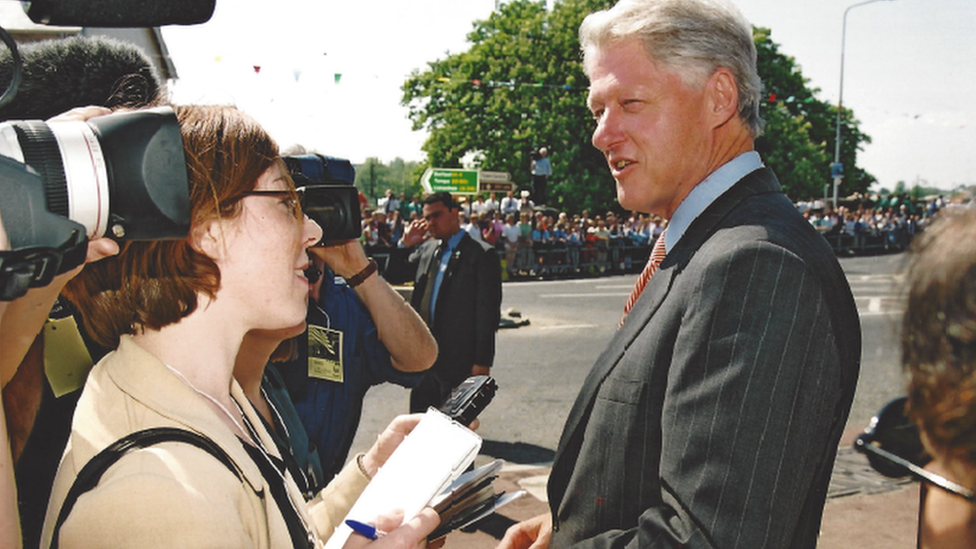
An impromptu interview with former US president Bill Clinton was a career highlight for Sarah Saunderson
She said her decision followed a "perfect storm" in which the recession and emerging online competition struck an often devastating blow to local newspapers across the UK.
Sarah is one of thousands of reporters who have since quit the profession, with estimates indicating the number of front-line journalists across the UK fell from around 23,000 in 2007 to around 17,000 in 2017, external.
Northern Ireland's vibrant local newspaper industry was worst hit - in percentage terms - losing 25% of its titles between 2012 and 2017, according to a government report, external.
Papers that survived often reduced staff to remain viable.
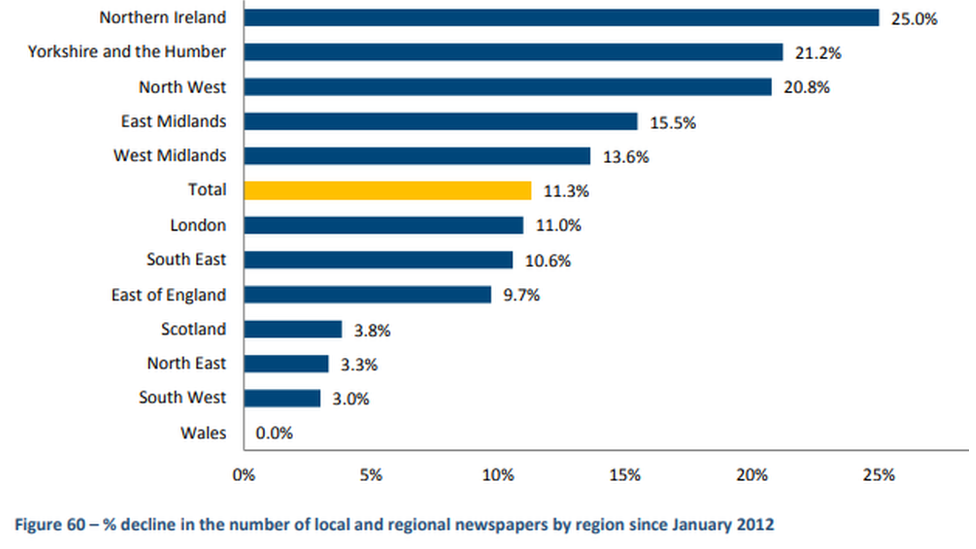
Journalists' jobs changed as weekly papers became 24-7 newsrooms, recalled Sarah Saunderson.
"From 2010 onwards it was really felt," she said. "It was a lot of pressure.
'Straw that broke the camel's back'
"My life in the office had been reduced to me sitting alone in front of a computer surrounded by four walls.
"I felt I was not being as good an editor as I could be. For me that was the straw that broke the camel's back.
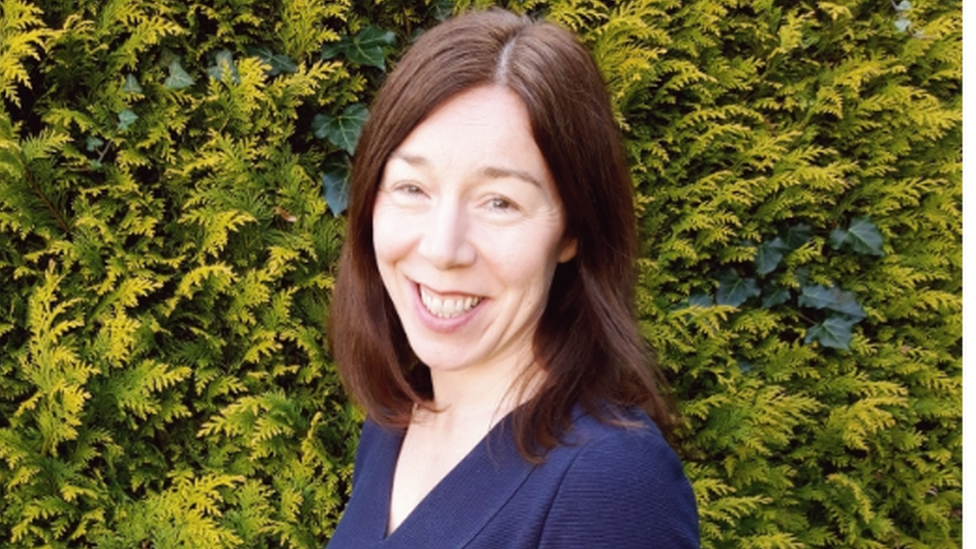
Sarah Saunderson is retraining as a teacher
"I realised I might not want to do this for the rest of my life. My dad passed away in June of 2017 and that made me re-evaluate everything."
Sarah left the Impartial Reporter in June 2018 and is now working as a teaching assistant while waiting to begin her teacher training course in September.
In her new role she says she now "laughs every day".
But the dramatic life change took its toll, which she believes demonstrates the oft untold human impact of the downturn.
'It was like grief'
"When I left the Impartial it was like grief," she said.
"I grieved for what had gone. We really were like family. It was really hard.
"The Impartial was my own weekly paper growing up. It is in my DNA, I have a big connection.
"I felt the job I had been appointed to do no longer existed. The industry is surviving, but not thriving."
Still an avid reader and supporter of The Impartial, which she says she "forensically dissects", Ms Saunderson hopes the fact that Northern Ireland's papers are "rooted in their communities" bodes well for the future, despite online challenges.
"Local newspapers have kept their individuality and connections," she said.
"If they stick to what they are good at, providing excellent local news you can't get anywhere else, they will create their best chance of survival."

Cairncross Review
A quarter of all regional and local newspapers have closed in the past decade, according to the Department for Digital, Culture, Media and Sport.
The government has published a report of recommendations for the press following the Cairncross Review, which looked into the future of UK news because of the news publishing industry revolution.
The review indicated the fall in circulation had hit local papers particularly hard, with just one in 10 people in the UK reading a regional or local newspaper each week, and younger audiences less interested in local news stories.
Recommendations include tax relief to encourage the provision of local journalism and expanding financial support for local news by extending the BBC's Local Democracy Reporting Service.

Despite an industry exodus, many young people are still drawn to print journalism.
Among them is Jessica Campbell, 26, who is following in Sarah Saunderson's footsteps as a trainee reporter at The Impartial.
'I have no regrets'
A first class honours graduate in fashion, Jessica said she turned down a position in the costume department of a popular television programme to be a reporter on the paper, which her grandfather formerly edited.
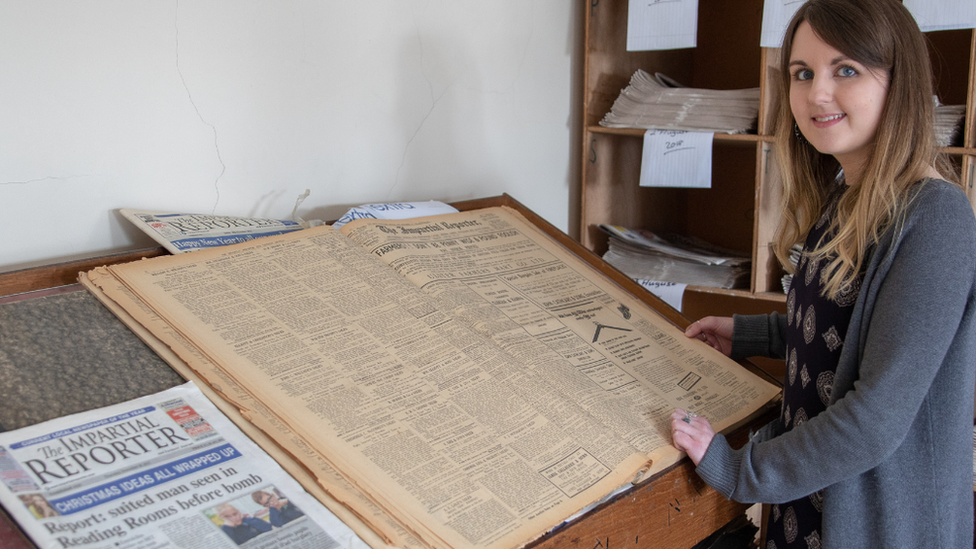
Jessica Campbell has "no regrets" about choosing local journalism, which she believes helps keep fake news at bay
"I have no regrets," she said. "I have chosen local journalism because I love Fermanagh.
"It's important to promote the county and share stories that may never be told if local newspapers didn't exist."
"There are concerns within any industry, and trends are trends, they change. For all we know the internet could end tomorrow and print journalism would be back on top."
Miss Campbell believes "local journalism is more important than ever" due to the uncertainty of Brexit and the ongoing Stormont stalemate, as Northern Ireland has been without a devolved government for more than two years..
"In my short time as a journalist, I have seen the power of the press and how quality impartial journalism helps keep trolls and fake news at bay," she said.
'There will be closures'
"Each story is a new challenge and I'm learning as I go along, which is a good way of training in journalism."
The Impartial Reporter's editor Mark Conway said the newspaper's print edition remained strong, despite its successful transition to a multimedia outlet.
He said its independent journalism and refusal to "accede to a world of sound bite journalism" had contributed to its success.
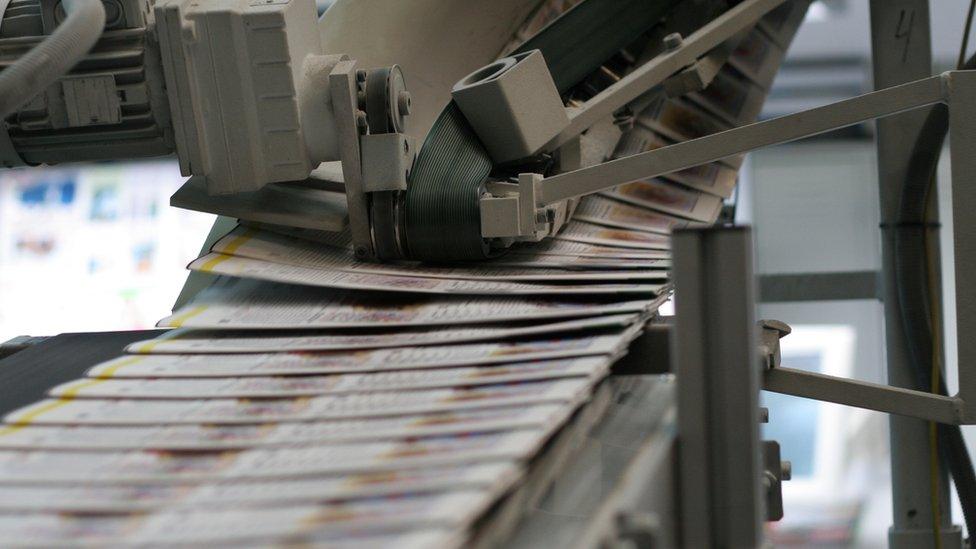
Northern Ireland's newspapers have been unusually hard hit by closure
"There are several ongoing initiatives looking at supporting the industry and local journalism is so vital that all help in these challenging times is welcomed," he said.
"I don't subscribe to the doom-and-gloom outlook for local newspapers. We just need to adapt and meet the challenges in front of us, which I believe we are doing.
"Society also needs to realise how important local newspapers are. So I would say get out and buy a local newspaper, support your local newspaper because it is the voice to represent you and what is going on in your community.
'Local papers retain trust'
Dr Colm Murphy, senior journalism lecturer at Ulster University, said Northern Ireland 's newspapers were unusually hard hit by closures because of the high proportion of papers per head, with some 51 local editions for 1.8m people.
"This is near levels in Scandinavian countries where there are indirect government subsidies for local newspapers," he said.
He said local paper sales were not decreasing as quickly as national newspapers.
"This is because local newspapers retain trust and also still have the resources to produce comprehensive local news in courts, councils, social events and crime," he said.
"But there will be closures, particularly if there is another economic downturn, as for many smaller circulation local newspapers the online competition for advertising coupled with increasing costs makes them non-viable."